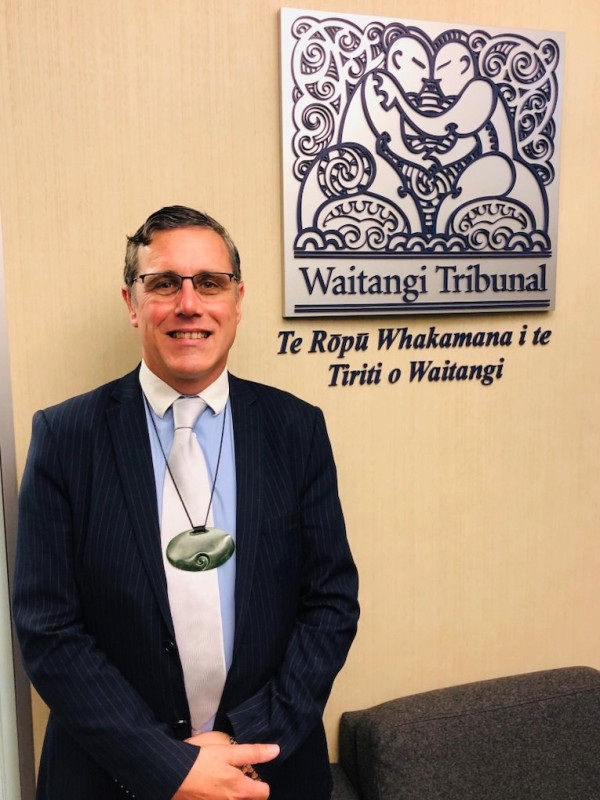Have you ever been asked “how Māori are you?” and felt like it diminished your mana?
Or maybe you’ve been the person that’s asked someone how Māori they are without realising the damage that’s being done.
Re: News spoke to tikanga and mātauranga Māori ethicist Dr Karaitiana Taiuru (Ngāi Tahu, Ngāti Kahungunu, Ngāti Toa) about what blood quantum is and how it came about.

Dr Karaitiana Taiuru. Photo supplied.
What does it mean to go by blood quantum?
Blood quantum is a racist and unscientific terminology of a percentage measurement of how much Indigenous/Māori blood a person has in their body.
This is calculated by the individual's genealogical descent.
So, a so-called ‘full-blooded Māori’ is an individual who has two parents that have the same genealogical background.
If a so-called ‘full-blooded Māori’ has a baby with a non-Māori, then the Māori would be called 50% Māori.
What is the history of blood quantum? Has this been used in other cultures?
Colonial settlers came up with the idea that an Indigenous person cannot be Indigenous if they have less than 50% Indigenous blood.
These colonial settlers invaded Indigenous Peoples' lands which include, but are not limited to, America, Alaska, Mexico, Canada and New Zealand.
They invaded with the intention of either extermination or breeding out the Indigenous Peoples for various reasons such as land allocation, ignoring treaties, de-population and non recognition of Indigenous Peoples.
Places such as America, had government officials keep records of individuals' blood percentages.
Is this something Māori have always been against?
Pre colonisation, the idea never existed in the same way as the colonial perspective.
The term Māori to describe our race was a post-colonial term. We simply self-identified as hapū (clans) made up of whānau groupings, ancestors or waka.
All Māori individuals are descendants of atua (deities). This reflects the current day notion that you are Māori if you have an ancestor who is Māori, regardless of how many generations ago - you are still from an atua Māori.
New Zealand law used the term ‘half-castes’ until recent legislation identified a Māori way of thinking about identity.
Historical documents such as Māori newspapers reflect a mixed opinion. Likely many Māori who were trying to fit into a new society used the term and the blood quantum formula. There are several transliterations to describe Māori who were not so-called ‘full-blooded’, by other Māori.
My reflections in Canterbury and the lower to mid-North Island in the 1970s to the 1980s is that blood quantum was a common question for fair-skinned Māori. I still remember my percentage number.
Being a fair-skinned Māori at the marae and other events meant proving how Māori you were via reo, waiata, pūrākau, and tikanga.
What do you think about blood quantum?
It is a racist colonial tool that has and still does create significant harm to Indigenous communities.
European colonists do not believe in spirituality like many Indigenous Peoples, apart from religious Gods, despite Europe being rich in history with many spiritual beliefs and many religions.
Blood quantum forces Indigenous Peoples to think in a colonial European way, ignoring who we are and creating divisions and classes of people based on blood allocations.
Indigenous Peoples in Hawai’i, Canada and America lose rights to tribal lands and benefits due to blood quantum. Examples of children not being recognised as Indigenous because they married a non Indigenous person, even though their parents are Indigenous, is horrific.
Are there any benefits to using a blood quantum approach?
Not at all. It is simply a weapon to attack and deny Indigenous Peoples.
Are there malicious intentions behind people asking how Māori someone is? Is it a whakaiti (put down) thing?
If another Māori person asked me that, I would say yes. That would be to whakaiti me.
Older New Zealanders who ask, I see it as a sign of their lack of intelligence and ignorance.
In recent years, various politicians who have stated they are Māori have been put down by other Māori politicians. We are all Māori if we have whakapapa to a tipuna/atua Māori, regardless of what political ideology or religion we subscribe to.
More stories:
What is koha and how much should I give?
How koha should be used appropriately.
South Auckland’s queer creative scene you may not know about
“Creativity, through any outlet, helped me understand that the way I’d felt, had a home.”
Should men pay for dates with women?
34% of our audience says yes, 66% says no.